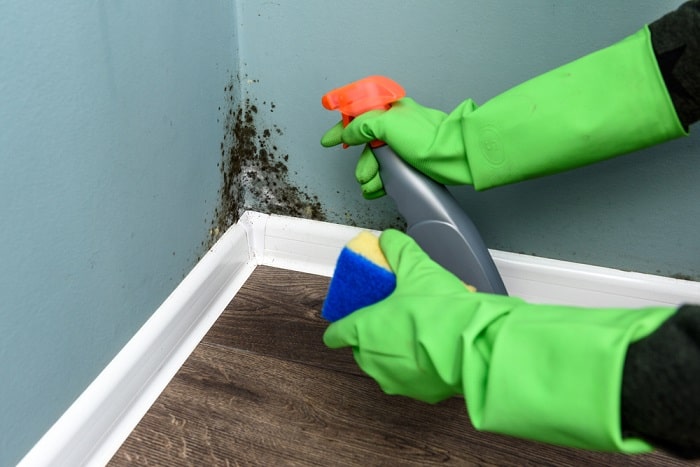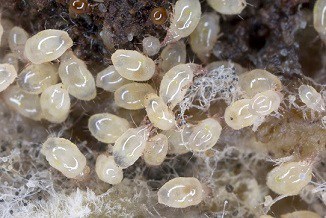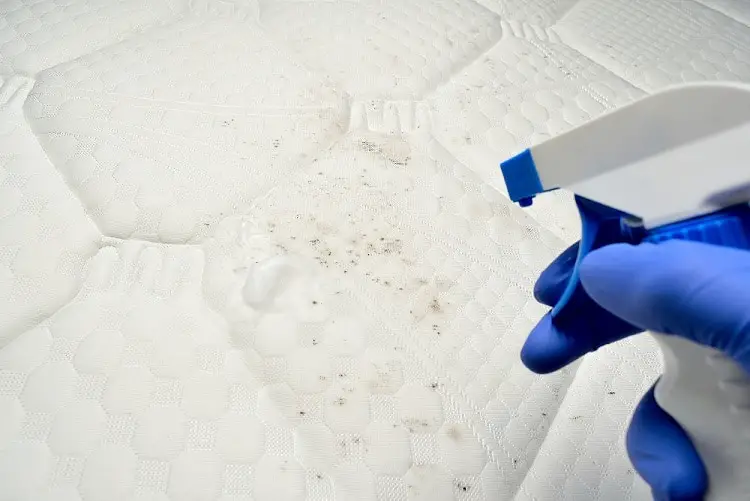Renting a new apartment can be a time filled with excitement and joy. A new beginning, a fresh start. The last thing you will likely be thinking about is mold. What are the rights of a tenant in Missouri if they discover mold in their apartment?
Tenants have the right to live in a home free from mold. A landlord has the responsibility to maintain a rental home for their tenant that is safe, habitable, and in good repair. Tenants should bring a mold concern to a landlord’s attention to allow the landlord to rectify the problem.
If you discover mold in your apartment, your rights as a tenant are not clear-cut.

Mold in Apartments and Tenant Rights in Missouri
The first thing you should do if you think that mold has taken over your apartment is to document the problem.
Course of Action Tips:
- Take pictures of visible mold growth on walls and floors. A picture can be worth a thousand words when you need to prove that there is mold in your apartment.
- Document the results of any mold testing that you or your landlord do.
- Check for prior traces of mold in the home; previous residents may have had mold issues.
- If you want to get out of your lease, find out whether legal assistance is available in your area.
For instance, the Tenant Resource Center has a list of how different communities handle mold cases.
Some allow tenants to break their leases because of mold if they can show proof that it poses an “imminent threat” to their health, whereas others require a doctor’s note or documentation from an environmental testing firm.
If you do not want to break your lease because of the mold problem, keep in mind that it is up to your landlord to resolve the problem.
They must take action by hiring experts and resolving all moisture issues that may have caused the existing mold.
Related Article: Missouri Landlord-Tenant Laws Regarding Mold: Know Your Rights

Is a Landlord Responsible for Mold in Missouri?
If you rent a property in Missouri, you will need to know your rights so you can protect yourself. Is a landlord responsible for mold in Missouri?
A landlord is responsible for mold in Missouri if a tenant moves into a rental property with an existing mold problem. Missouri law states that landlords are responsible for the removal of that mold.
Here are some things that you should be aware of when it comes to mold and landlords.
The Definition of Mold
Mold is generally defined as harmful fungi that can grow on any organic material, usually causing a musty odor and appearance.
The Importance of Removing Mold Quickly
Mold can spread over a large area if not removed quickly. The best way to do this is by hiring professionals who are trained in mold removal.
Any delay in removing the mold can spread it to other parts of your house, making the problem much worse.
The longer you wait before taking action, the more likely it is that you will have health problems caused by exposure to mold.
The Liability of Your Landlord Is If They Fail to Remove Mold
If your landlord fails to remove mold from your home and you later discover that it has caused an illness, the landlord may be held liable.
The landlord must make sure that there is no mold or mustiness in the house before signing the lease.
If you move into a property with an existing mold, then Missouri state law states that landlords are responsible for the removal of that mold.
The Legal Rights of a Tenant Is If Mold Is Caused By Landlord Negligence
If you rent a property and discover mold, your landlord is liable to remove it as long as they knew about its presence at the time of the lease.
This applies even if you did not inform them about the problem.
If the landlord has not had a professional come in to remove the mold, you can seek legal advice on whether they are responsible for any health problems that you have suffered, including damage to your property or belongings.
Related Article: Humidity causes mold and health problems. An ERV system can reduce the humidity in your home significantly. What is an Energy Recovery Ventilator (ERV)? Ultimate Resource

What Are Considered Uninhabitable Living Conditions in Missouri?
Living conditions that would be considered uninhabitable in Missouri vary depending on what part of the state you’re living in.
Generally, if a person were to live without necessities such as running water or electricity for extended periods, then it may be considered an uninhabitable living condition.
Legal action should be taken against the party responsible for providing housing to the individual if they are refusing to repair the uninhabitable condition immediately.
How Long Does a Landlord Have to Fix a Mold Problem in Missouri?
When mold is found, it needs to be addressed sooner rather than later. If a landlord does not act promptly when they receive a written notice of mold, the tenant can take further action.
Tenants can move out without being responsible for future rent if the landlord does not perform the repairs.
Alternatively, tenants can stay in the rental and sue the landlord for damages, which would be the difference between the stated rent and the rental’s worth due to its deplorable condition.
Landlords can also be ordered to make repairs by judges.
The law requires landlords and tenants to work together and cooperate to get problems fixed.
What needs to be done for this problem will depend on the type of mold, whether it is causing an “immediate danger to human life” or an “immediate and serious threat to the health or safety of occupants,” the actual rental unit affected, how much work is needed, etc.
The first step should be to discuss the problem with the landlord to find out what needs to be done and how it can be fixed as quickly as possible.
Related Article: What Happens if Indoor Humidity Is Too High?

Can You Break a Rental Lease Due to Mold in Missouri?
Unfortunately, the answers can be tricky and they can vary from situation to situation.
Generally speaking, if a tenant can prove that mold is dangerous they can break their lease by vacating early.
Of course, it depends on whether or not the landlord can either fix the problem or release you from your rental agreement without penalty.
The most important thing to keep in mind is that you can’t be held responsible for the mold problem if you’ve done everything you could by using ventilation systems during hot showers and baths and while cooking.
A tenant can prove being affected by mold with medical documentation of their allergies or respiratory problems that can be linked back to living in a place with mold.
If all evidence points toward the tenant being forced out by their health then most states will rule in favor of releasing them from their rental agreement.
This can be a very important thing to have in writing so it’s always best to ask an attorney about the specifics of your situation.
If a tenant can prove that they can’t live there because of mold then the landlord needs to take care of this problem as soon as possible.
The longer you’re stuck living somewhere with mold the more likely you can break your lease.
If the landlord can’t fix the mold problem, then they should release you from your rental agreement.
Related Article: How Does Humidity Affect the Building Structure of a House?

How Do You Know if Mold is Making You Sick?
Just like mold, mold allergies can be hidden and can cause mold-related illnesses to go undetected for years. How do you know if mold is making you sick?
Mold could potentially be making you sick if you are suffering from muscle aches, throat irritation, scratchy eyes, headaches, fatigue, runny nose, skin irritation, and dizziness. More serious symptoms include nerve and joint pain, tremors, numbness or tingling, and constant colds or the flu.
But the question remains; how do you know if mold is making you sick? The first step towards mold identification is mold awareness.
Allergic reactions to mold are classified as either immediate or delayed hypersensitivity reactions.
Mold could be making you sick if you’ve been exposed to mold and later develop the following symptoms:
- Eye irritation
- Constant runny nose
- Throat scratchiness and irritation
- Headaches
- Fatigue
- Skin rash
- Muscle aches
Mold allergies happen hours or days after mold exposure and mold allergy symptoms can appear in 3 different forms:
1. Localized mold sensitivities
2. General mold sensitivity
3. Mold-related illnesses
Toxins in your system from inhaling mold spores contribute to your overall toxicity level.
This is referred to as the Total Body Burden. When your burden is elevated, you begin to experience symptoms, many of which appear to be unrelated.
Toxins are flushed out of the body by most people when they eliminate feces.
While some people experience a toxic load so great that the body is unable to effectively eliminate all of them, others may have impaired detoxification systems or may even recycle or reabsorb mycotoxins while the body attempts to eliminate them.
This variation from person to person is largely due to genetics.
Genetics plays a large role in how the body processes exposure to mold.
Mold spores can take root and thrive in specific bodily organs, such as the lungs and sinuses, in some situations.
This can result in serious infections and respiratory disorders.
More serious symptoms of mold exposure include:
- Constant colds and flu
- Tremors, tingling, or numbness
- Joint pain
- Migraines
- Issues with memory
- Aches and pains in muscles
- Dizziness
- Body weakness
- Nerve pain
Mold is everywhere, indoors and outdoors, in your neighborhood, at school, or at work.
Indoor mold occurs in buildings where moisture is present for extended periods, including homes, schools, commercial buildings, and office spaces.
And mold problems are getting worse with climate change because mold thrives on moisture.
The mold detection process starts locally within your immediate environment, usually with mold growing behind or beneath cabinets, under the sink, or in a bathroom.
Mold may be hidden in walls and has also been found inside shingles used on a home’s roof.
Mold can also grow on buildings or home foundations; the list goes on.
Once you have identified the source of the mold, it’s time to take further action. One way to determine your mold exposure risk is with a simple at-home mold test kit.
Related Article: Can High Humidity in a Home Cause Mold? Protect Yourself

Can You Sue Your Landlord for Mold Exposure in Missouri?
If the property you rent has been exposed to dangerous levels of mold, you may have a claim against the landlord. Can you sue your landlord for mold exposure in Missouri?
You can sue your landlord for mold in Missouri if you can prove that your landlord breached his or her duty to protect your health and safety and violated the rental agreement. You could potentially collect damages for medical bills, lost wages, loss of property value, and pain and suffering.
In Missouri, there are several ways that tenants could potentially sue for damages relating to indoor air quality and mold spore exposure in rental properties.
Some landlords include mold clauses in rental agreements to protect themselves from liability in the event of illness caused by mold. These clauses provide the landlord with an exemption from liability in such circumstances.
It is an unfortunate fact that most people who suffer from mold exposure do not even realize it until they have suffered significant health concerns for a long period.
Suing for mold in Missouri could potentially be successful if the mold damage and exposure were caused by negligence on behalf of the landlord or due to failure to uphold legal responsibilities as set out in the Landlord-Tenant Act.
To ensure that you have a strong claim, it is important to understand the different laws that protect tenants in Missouri.
Under the Missouri Residential Landlord and Tenant Act, all rental properties are required to be fit for human occupation.
This means that landlords must keep their properties safe from dangers such as mold or other potentially hazardous conditions.
Suing your landlord due to mold exposure is potentially successful if the landlord failed to maintain a healthy environment free from mold, which led to your illness.
We need to mention here that it is also the tenant’s responsibility to do their part to the best of their ability in the prevention of mold.
Fans need to be used when taking hot baths or showers and while cooking.
Steam from the bathroom and cooking causes humidity levels in a home to rise, and the moisture in the air is what mold thrives on.
If the ventilation systems in your rental home are not functioning properly, it is the tenant’s responsibility to ask the landlord for repairs.
Suing for mold in Missouri could be tough, so you must have all of the necessary evidence to support your case.
In Missouri, landlords are also required by law to provide trash receptacles and take reasonable steps to ensure that trash is stored in a manner that does not endanger the health and safety of any people living in the building.
A lawsuit could be successful if a landlord failed to take the proper steps to protect tenants from potentially harmful mold spores, which contaminated a tenant’s food products.
In addition to these responsibilities under state law, it is also a good idea to check your rental agreement and see what specific responsibilities are stated there.
Does the rental agreement state that the landlord is responsible for maintaining indoor air quality or taking care of mold issues as they arise?
Before moving forward with a mold lawsuit, it is important to gather as much evidence as possible regarding the conditions of the rental property.
Suing for mold should always be a last resort, and should only occur if all other avenues have been exhausted.
If you suspect that your health concerns are being caused by mold at your current place of residence, don’t hesitate to contact a qualified attorney in Missouri.
Suing for mold can be a complex process, and it is important to be well-informed before moving forward.
If you were able to prove that your landlord breached his or her duty to protect your health and safety, you could potentially collect damages for medical bills, lost wages, loss of property value, and more.
Related Article: What Causes High Humidity in a House? Your Questions Answered
Sources

Trina Greenfield, Author
SmackDown Media LLC
LinkedIn
About the Author:
Trina Greenfield, the owner of SmackDown Media LLC, is passionate about providing information to those interested in the air quality in and around their homes. Trina writes content about things she’s passionate about, such as safe, in-home air, educational platforms for children and adults, as well as all things family-related.
